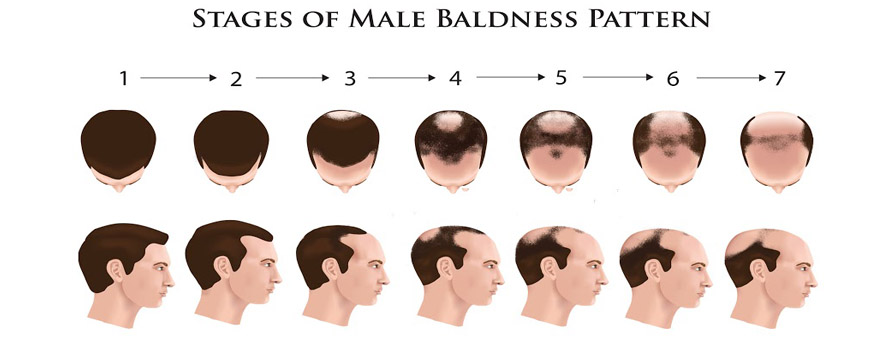What causes baldness? Understand why people lose their hair
Table Of Content

Dramatic changes in the body can cause temporary hair loss. Giving birth, rapid weight loss, surgery and certain illnesses may cause more hair loss than usual, typically in the resting phase. The thyroid gland in your neck makes hormones necessary to regulate breathing, heart rate, mood, and digestion. When the thyroid doesn't work correctly, it can cause hormonal imbalances that affect the entire body.
Vitamin A
Here's how health conditions, stress, and hormonal changes can make your hair fall out—plus what you can do to regrow your hair. Sometimes hair loss is a sign of a condition called hyperandrogenism, which happens when your body makes too many androgens (male hormones). In women and others with female reproductive organs, its most common cause is polycystic ovary syndrome (PCOS). Along with hair loss, other signs of PCOS include weight gain, acne, and irregular periods.
Conditions

Not only can starting hormonal birth control kick off hair loss, so can quitting. You’ll probably notice a change several weeks or months after you stop. STIs like syphilis can cause you to lose hair in patches on the scalp, eyebrows, and face.
Hair Loss Prevention: 22 Tips to Help Save Your Hair
Your scalp hair can last up to six years or even longer. Hair grows on almost all of your skin surfaces — not the palms of your hands, soles of your feet, lips or eyelids. Some people may choose to use a scalp concealer, hair topper, or other product to cover hair loss. Certain medications have side effects that can cause hair to fall out.
Some research connects excess intake of vitamin A or selenium with an increased risks for hair loss. They may also order blood tests to check for any nutrient deficiencies or signs of an underlying condition. Traction alopecia results from too much pressure and tension on the hair, often from wearing it in tight styles, like braids, ponytails, or buns. Yes, hair tends to regrow when you are no longer exposed to the poison. With minoxidil, you might also see hair growing in places other than your scalp (cheeks and forehead, for example).
This can have many causes, including medical conditions, physical and psychological causes, and certain medications. In most cases, telogen effluvium is temporary and resolves without treatment. However, you may need to work with your healthcare provider to find and treat any underlying conditions that are causing your hair to fall out. Traction alopecia is the result of environmental factors, such as wearing your hair in tight hairstyles, Agbai says. Chemotherapy treatment can damage hair follicles, causing the hair to fall out on the head and body. How much hair someone loses during chemo depends on the person and the drug used.
Why is my hair falling out? - USA TODAY
Why is my hair falling out?.
Posted: Wed, 18 Oct 2023 07:00:00 GMT [source]
Many of these nongenetic causes for hair loss can be successfully treated, and the hair loss averted and even reversed. Lupus is an autoimmune disease that can cause hair loss. Generally, the hair loss is patchy and accompanied by lesions on the scalp. Both hyperthyroid disorder (an overactive thyroid gland) and hypothyroid disorder (a sluggish thyroid) can lead to excessive shedding.
Washing your hair daily may protect against hair loss by keeping your scalp healthy and clean. Harsher formulas may dry out your hair and cause it to break, leading to hair loss. Some people have an urge to pull out their own hair -- from the scalp, eyebrows, or someplace else -- a chronic condition known as trichotillomania. Temporary hair loss can be a sign of a medical issue, like anemia or thyroid problems. A diet low in protein and iron can also cause your hair to thin.
Other treatments
If you think you have age-related hair loss, talk to your doctor about treatment early on. Female hair loss happens when a woman, or anyone who was identified as female at birth, loses more hair than normal. About half of all women will have hair loss at some point in life. Most start to notice it in their 50s or 60s, but it can happen at any age and for a variety of reasons. Not all researchers agree that spironolactone works, and the FDA has not endorsed it as a treatment for androgenic alopecia. However, the medication has still been used off-label for years to treat hair loss in women.

With age, most people notice some hair loss because hair growth slows. At some point, hair follicles stop growing hair, which causes the hair on our scalp to thin. Wearing a ponytail, braids, or cornrows where the hair next to the scalp is pulled tightly can cause temporary hair loss called traction alopecia. In addition, hot oil treatments and perms may damage your hair follicles. Radiation therapy can also cause hair loss by damaging the hair follicles.
It is typically temporary (unless the follicles are damaged). Hair loss can affect people differently depending on genetics, hormonal changes, or health conditions. Regardless of the cause, treatment to regrow hair is typically more effective if you catch hair loss early.
Comments
Post a Comment